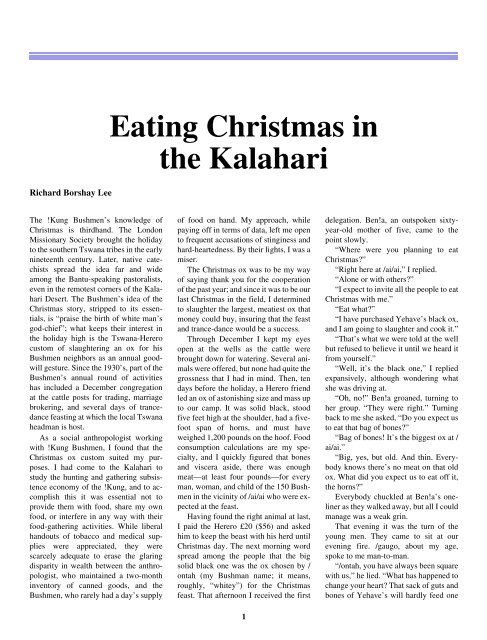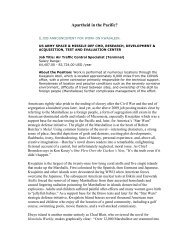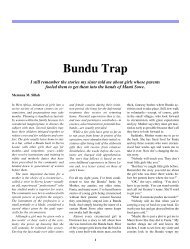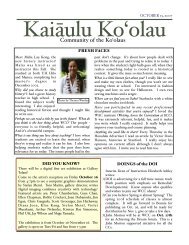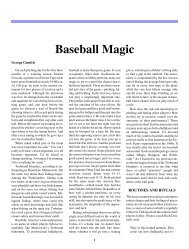Eating Christmas in the Kalahari
Eating Christmas in the Kalahari
Eating Christmas in the Kalahari
You also want an ePaper? Increase the reach of your titles
YUMPU automatically turns print PDFs into web optimized ePapers that Google loves.
Article 4<br />
Richard Borshay Lee<br />
The !Kung Bushmen’s knowledge of<br />
<strong>Christmas</strong> is thirdhand. The London<br />
Missionary Society brought <strong>the</strong> holiday<br />
to <strong>the</strong> sou<strong>the</strong>rn Tswana tribes <strong>in</strong> <strong>the</strong> early<br />
n<strong>in</strong>eteenth century. Later, native catechists<br />
spread <strong>the</strong> idea far and wide<br />
among <strong>the</strong> Bantu-speak<strong>in</strong>g pastoralists,<br />
even <strong>in</strong> <strong>the</strong> remotest corners of <strong>the</strong> <strong>Kalahari</strong><br />
Desert. The Bushmen’s idea of <strong>the</strong><br />
<strong>Christmas</strong> story, stripped to its essentials,<br />
is “praise <strong>the</strong> birth of white man’s<br />
god-chief”; what keeps <strong>the</strong>ir <strong>in</strong>terest <strong>in</strong><br />
<strong>the</strong> holiday high is <strong>the</strong> Tswana-Herero<br />
custom of slaughter<strong>in</strong>g an ox for his<br />
Bushmen neighbors as an annual goodwill<br />
gesture. S<strong>in</strong>ce <strong>the</strong> 1930’s, part of <strong>the</strong><br />
Bushmen’s annual round of activities<br />
has <strong>in</strong>cluded a December congregation<br />
at <strong>the</strong> cattle posts for trad<strong>in</strong>g, marriage<br />
broker<strong>in</strong>g, and several days of trancedance<br />
feast<strong>in</strong>g at which <strong>the</strong> local Tswana<br />
headman is host.<br />
As a social anthropologist work<strong>in</strong>g<br />
with !Kung Bushmen, I found that <strong>the</strong><br />
<strong>Christmas</strong> ox custom suited my purposes.<br />
I had come to <strong>the</strong> <strong>Kalahari</strong> to<br />
study <strong>the</strong> hunt<strong>in</strong>g and ga<strong>the</strong>r<strong>in</strong>g subsistence<br />
economy of <strong>the</strong> !Kung, and to accomplish<br />
this it was essential not to<br />
provide <strong>the</strong>m with food, share my own<br />
food, or <strong>in</strong>terfere <strong>in</strong> any way with <strong>the</strong>ir<br />
food-ga<strong>the</strong>r<strong>in</strong>g activities. While liberal<br />
handouts of tobacco and medical supplies<br />
were appreciated, <strong>the</strong>y were<br />
scarcely adequate to erase <strong>the</strong> glar<strong>in</strong>g<br />
disparity <strong>in</strong> wealth between <strong>the</strong> anthropologist,<br />
who ma<strong>in</strong>ta<strong>in</strong>ed a two-month<br />
<strong>in</strong>ventory of canned goods, and <strong>the</strong><br />
Bushmen, who rarely had a day’s supply<br />
<strong>Eat<strong>in</strong>g</strong> <strong>Christmas</strong> <strong>in</strong><br />
<strong>the</strong> <strong>Kalahari</strong><br />
of food on hand. My approach, while<br />
pay<strong>in</strong>g off <strong>in</strong> terms of data, left me open<br />
to frequent accusations of st<strong>in</strong>g<strong>in</strong>ess and<br />
hard-heartedness. By <strong>the</strong>ir lights, I was a<br />
miser.<br />
The <strong>Christmas</strong> ox was to be my way<br />
of say<strong>in</strong>g thank you for <strong>the</strong> cooperation<br />
of <strong>the</strong> past year; and s<strong>in</strong>ce it was to be our<br />
last <strong>Christmas</strong> <strong>in</strong> <strong>the</strong> field, I determ<strong>in</strong>ed<br />
to slaughter <strong>the</strong> largest, meatiest ox that<br />
money could buy, <strong>in</strong>sur<strong>in</strong>g that <strong>the</strong> feast<br />
and trance-dance would be a success.<br />
Through December I kept my eyes<br />
open at <strong>the</strong> wells as <strong>the</strong> cattle were<br />
brought down for water<strong>in</strong>g. Several animals<br />
were offered, but none had quite <strong>the</strong><br />
grossness that I had <strong>in</strong> m<strong>in</strong>d. Then, ten<br />
days before <strong>the</strong> holiday, a Herero friend<br />
led an ox of astonish<strong>in</strong>g size and mass up<br />
to our camp. It was solid black, stood<br />
five feet high at <strong>the</strong> shoulder, had a fivefoot<br />
span of horns, and must have<br />
weighed 1,200 pounds on <strong>the</strong> hoof. Food<br />
consumption calculations are my specialty,<br />
and I quickly figured that bones<br />
and viscera aside, <strong>the</strong>re was enough<br />
meat—at least four pounds—for every<br />
man, woman, and child of <strong>the</strong> 150 Bushmen<br />
<strong>in</strong> <strong>the</strong> vic<strong>in</strong>ity of /ai/ai who were expected<br />
at <strong>the</strong> feast.<br />
Hav<strong>in</strong>g found <strong>the</strong> right animal at last,<br />
I paid <strong>the</strong> Herero £20 ($56) and asked<br />
him to keep <strong>the</strong> beast with his herd until<br />
<strong>Christmas</strong> day. The next morn<strong>in</strong>g word<br />
spread among <strong>the</strong> people that <strong>the</strong> big<br />
solid black one was <strong>the</strong> ox chosen by /<br />
ontah (my Bushman name; it means,<br />
roughly, “whitey”) for <strong>the</strong> <strong>Christmas</strong><br />
feast. That afternoon I received <strong>the</strong> first<br />
1<br />
delegation. Ben!a, an outspoken sixtyyear-old<br />
mo<strong>the</strong>r of five, came to <strong>the</strong><br />
po<strong>in</strong>t slowly.<br />
“Where were you plann<strong>in</strong>g to eat<br />
<strong>Christmas</strong>?”<br />
“Right here at /ai/ai,” I replied.<br />
“Alone or with o<strong>the</strong>rs?”<br />
“I expect to <strong>in</strong>vite all <strong>the</strong> people to eat<br />
<strong>Christmas</strong> with me.”<br />
“Eat what?”<br />
“I have purchased Yehave’s black ox,<br />
and I am go<strong>in</strong>g to slaughter and cook it.”<br />
“That’s what we were told at <strong>the</strong> well<br />
but refused to believe it until we heard it<br />
from yourself.”<br />
“Well, it’s <strong>the</strong> black one,” I replied<br />
expansively, although wonder<strong>in</strong>g what<br />
she was driv<strong>in</strong>g at.<br />
“Oh, no!” Ben!a groaned, turn<strong>in</strong>g to<br />
her group. “They were right.” Turn<strong>in</strong>g<br />
back to me she asked, “Do you expect us<br />
to eat that bag of bones?”<br />
“Bag of bones! It’s <strong>the</strong> biggest ox at /<br />
ai/ai.”<br />
“Big, yes, but old. And th<strong>in</strong>. Everybody<br />
knows <strong>the</strong>re’s no meat on that old<br />
ox. What did you expect us to eat off it,<br />
<strong>the</strong> horns?”<br />
Everybody chuckled at Ben!a’s onel<strong>in</strong>er<br />
as <strong>the</strong>y walked away, but all I could<br />
manage was a weak gr<strong>in</strong>.<br />
That even<strong>in</strong>g it was <strong>the</strong> turn of <strong>the</strong><br />
young men. They came to sit at our<br />
even<strong>in</strong>g fire. /gaugo, about my age,<br />
spoke to me man-to-man.<br />
“/ontah, you have always been square<br />
with us,” he lied. “What has happened to<br />
change your heart? That sack of guts and<br />
bones of Yehave’s will hardly feed one
camp, let alone all <strong>the</strong> Bushmen around<br />
ai/ai.” And he proceeded to enumerate<br />
<strong>the</strong> seven camps <strong>in</strong> <strong>the</strong> /ai/ai vic<strong>in</strong>ity,<br />
family by family. “Perhaps you have forgotten<br />
that we are not few, but many. Or<br />
are you too bl<strong>in</strong>d to tell <strong>the</strong> difference between<br />
a proper cow and an old wreck?<br />
That ox is th<strong>in</strong> to <strong>the</strong> po<strong>in</strong>t of death.”<br />
“Look, you guys,” I retorted, “that is<br />
a beautiful animal, and I”m sure you will<br />
eat it with pleasure at <strong>Christmas</strong>.”<br />
“Of course we will eat it; it’s food.<br />
But it won’t fill us up to <strong>the</strong> po<strong>in</strong>t where<br />
we will have enough strength to dance.<br />
We will eat and go home to bed with<br />
stomachs rumbl<strong>in</strong>g.”<br />
That night as we turned <strong>in</strong>, I asked my<br />
wife, Nancy: “What did you th<strong>in</strong>k of <strong>the</strong><br />
black ox?”<br />
“It looked enormous to me. Why?”<br />
“Well, about eight different people<br />
have told me I got gypped; that <strong>the</strong> ox is<br />
noth<strong>in</strong>g but bones.”<br />
“What’s <strong>the</strong> angle?” Nancy asked.<br />
“Did <strong>the</strong>y have a better one to sell?”<br />
“No, <strong>the</strong>y just said that it was go<strong>in</strong>g to<br />
be a grim <strong>Christmas</strong> because <strong>the</strong>re won’t<br />
be enough meat to go around. Maybe I’ll<br />
get an <strong>in</strong>dependent judge to look at <strong>the</strong><br />
beast <strong>in</strong> <strong>the</strong> morn<strong>in</strong>g.”<br />
Bright and early, Hal<strong>in</strong>gisi, a Tswana<br />
cattle owner, appeared at our camp. But<br />
before I could ask him to give me his<br />
op<strong>in</strong>ion on Yehave’s black ox, he gave<br />
me <strong>the</strong> eye signal that <strong>in</strong>dicated a confidential<br />
chat. We left <strong>the</strong> camp and sat<br />
down.<br />
“/ontah, I’m surprised at you: you’ve<br />
lived here for three years and still haven’t<br />
learned anyth<strong>in</strong>g about cattle.”<br />
“But what else can a person do but<br />
choose <strong>the</strong> biggest, strongest animal one<br />
can f<strong>in</strong>d?” I retorted.<br />
“Look, just because an animal is big<br />
doesn’t mean that it has plenty of meat<br />
on it. The black one was a beauty when it<br />
was younger, but now it is th<strong>in</strong> to <strong>the</strong><br />
po<strong>in</strong>t of death.”<br />
“Well I’ve already bought it. What<br />
can I do at this stage?”<br />
“Bought it already? I thought you<br />
were just consider<strong>in</strong>g it. Well, you’ll<br />
have to kill it and serve it, I suppose. But<br />
don’t expect much of a dance to follow.”<br />
My spirits dropped rapidly. I could<br />
believe that Ben!a and /gaugo just might<br />
be putt<strong>in</strong>g me on about <strong>the</strong> black ox, but<br />
Hal<strong>in</strong>gisi seemed to be an impartial<br />
critic. I went around that day feel<strong>in</strong>g as<br />
though I had bought a lemon of a used<br />
car.<br />
In <strong>the</strong> afternoon it was Tomazo’s turn.<br />
Tomazo is a f<strong>in</strong>e hunter, a top trance performer…<br />
and one of my most reliable <strong>in</strong>formants.<br />
He approached <strong>the</strong> subject of<br />
<strong>the</strong> <strong>Christmas</strong> cow as part of my cont<strong>in</strong>u<strong>in</strong>g<br />
Bushman education.<br />
“My friend, <strong>the</strong> way it is with us<br />
Bushmen,” he began, “is that we love<br />
meat. And even more than that, we love<br />
fat. When we hunt we always search for<br />
<strong>the</strong> fat ones, <strong>the</strong> ones dripp<strong>in</strong>g with layers<br />
of white fat: fat that turns <strong>in</strong>to a clear,<br />
thick oil <strong>in</strong> <strong>the</strong> cook<strong>in</strong>g pot, fat that slides<br />
down your gullet, fills your stomach and<br />
gives you a roar<strong>in</strong>g diarrhea,” he rhapsodized.<br />
“So, feel<strong>in</strong>g as we do,” he cont<strong>in</strong>ued,<br />
“it gives us pa<strong>in</strong> to be served such a<br />
scrawny th<strong>in</strong>g as Yehave’s black ox. It is<br />
big, yes, and no doubt its giant bones are<br />
good for soup, but fat is what we really<br />
crave and so we will eat <strong>Christmas</strong> this<br />
year with a heavy heart.”<br />
The prospect of a gloomy <strong>Christmas</strong><br />
now had me worried, so I asked Tomazo<br />
what I could do about it.<br />
“Look for a fat one, a young one…<br />
smaller, but fat. Fat enough to make us /<br />
/gom (‘evacuate <strong>the</strong> bowels’), <strong>the</strong>n we<br />
will be happy.”<br />
My suspicions were aroused when<br />
Tomazo said that he happened to know<br />
of a young, fat, barren cow that <strong>the</strong><br />
owner was will<strong>in</strong>g to part with. Was<br />
Tomazo work<strong>in</strong>g on commission, I wondered?<br />
But I dispelled this unworthy<br />
thought when we approached <strong>the</strong> Herero<br />
owner of <strong>the</strong> cow <strong>in</strong> question and found<br />
that he had decided not to sell.<br />
The scrawny wreck of a <strong>Christmas</strong> ox<br />
now became <strong>the</strong> talk of <strong>the</strong> /ai/ai water<br />
hole and was <strong>the</strong> first news told to <strong>the</strong><br />
outly<strong>in</strong>g groups as <strong>the</strong>y began to come <strong>in</strong><br />
from <strong>the</strong> bush for <strong>the</strong> feast. What f<strong>in</strong>ally<br />
conv<strong>in</strong>ced me that real trouble might be<br />
brew<strong>in</strong>g was <strong>the</strong> visit from u!au, an old<br />
conservative with a reputation for fierceness.<br />
His nickname meant spear and referred<br />
to an <strong>in</strong>cident thirty years ago <strong>in</strong><br />
which he had speared a man to death. He<br />
had an <strong>in</strong>tense manner; fix<strong>in</strong>g me with<br />
his eyes, he said <strong>in</strong> clipped tones:<br />
2<br />
Article 4. <strong>Eat<strong>in</strong>g</strong> <strong>Christmas</strong> <strong>in</strong> <strong>the</strong> <strong>Kalahari</strong><br />
“I have only just heard about <strong>the</strong><br />
black ox today, or else I would have<br />
come here earlier. /ontah, do you honestly<br />
th<strong>in</strong>k you can serve meat like that to<br />
people and avoid a fight?” He paused,<br />
lett<strong>in</strong>g <strong>the</strong> implications s<strong>in</strong>k <strong>in</strong>. “I don’t<br />
mean fight you, /ontah; you are a white<br />
man. I mean a fight between Bushmen.<br />
There are many fierce ones here, and<br />
with such a small quantity of meat to distribute,<br />
how can you give everybody a<br />
fair share? Someone is sure to accuse ano<strong>the</strong>r<br />
of tak<strong>in</strong>g too much or hogg<strong>in</strong>g all<br />
<strong>the</strong> choice pieces. Then you will see<br />
what happens when some go hungry<br />
while o<strong>the</strong>rs eat.”<br />
The possibility of at least a serious argument<br />
struck me as all too real. I had<br />
witnessed <strong>the</strong> tension that surrounds <strong>the</strong><br />
distribution of meat from a kudu or<br />
gemsbok kill, and had documented many<br />
arguments that sprang up from a real or<br />
imag<strong>in</strong>ed slight <strong>in</strong> meat distribution. The<br />
owners of a kill may spend up to two<br />
hours arrang<strong>in</strong>g and rearrang<strong>in</strong>g <strong>the</strong> piles<br />
of meat under <strong>the</strong> gaze of a circle of recipients<br />
before hand<strong>in</strong>g <strong>the</strong>m out. And I<br />
also knew that <strong>the</strong> <strong>Christmas</strong> feast at /ai/<br />
ai would be br<strong>in</strong>g<strong>in</strong>g toge<strong>the</strong>r groups that<br />
had feuded <strong>in</strong> <strong>the</strong> past.<br />
Conv<strong>in</strong>ced now of <strong>the</strong> gravity of <strong>the</strong><br />
situation, I went <strong>in</strong> earnest to search for a<br />
second cow; but all my <strong>in</strong>quiries failed to<br />
turn one up.<br />
The <strong>Christmas</strong> feast was evidently<br />
go<strong>in</strong>g to be a disaster, and <strong>the</strong> <strong>in</strong>cessant<br />
compla<strong>in</strong>ts about <strong>the</strong> meagerness of <strong>the</strong><br />
ox had already taken <strong>the</strong> fun out of it for<br />
me. Moreover, I was gett<strong>in</strong>g bored with<br />
<strong>the</strong> wisecracks, and after los<strong>in</strong>g my temper<br />
a few times, I resolved to serve <strong>the</strong><br />
beast anyway. If <strong>the</strong> meat fell short, <strong>the</strong><br />
hell with it. In <strong>the</strong> Bushmen idiom, I announced<br />
to all who would listen:<br />
“I am a poor man and bl<strong>in</strong>d. If I have<br />
chosen one that is too old and too th<strong>in</strong>,<br />
we will eat it anyway and see if <strong>the</strong>re is<br />
enough meat <strong>the</strong>re to quiet <strong>the</strong> rumbl<strong>in</strong>g<br />
of our stomachs.”<br />
On hear<strong>in</strong>g this speech, Ben!a offered<br />
me a rare word of comfort. “It’s th<strong>in</strong>,”<br />
she said philosophically, “but <strong>the</strong> bones<br />
will make a good soup.”<br />
At dawn <strong>Christmas</strong> morn<strong>in</strong>g, <strong>in</strong>st<strong>in</strong>ct<br />
told me to turn over <strong>the</strong> butcher<strong>in</strong>g and<br />
cook<strong>in</strong>g to a friend and take off with<br />
Nancy to spend <strong>Christmas</strong> alone <strong>in</strong> <strong>the</strong>
ANNUAL EDITIONS<br />
bush. But curiosity kept me from retreat<strong>in</strong>g.<br />
I wanted to see what such a scrawny<br />
ox looked like on butcher<strong>in</strong>g and if <strong>the</strong>re<br />
was go<strong>in</strong>g to be a fight, I wanted to catch<br />
every word of it. Anthropologists are <strong>in</strong>curable<br />
that way.<br />
The great beast was driven up to our<br />
danc<strong>in</strong>g ground, and a shot <strong>in</strong> <strong>the</strong> forehead<br />
dropped it <strong>in</strong> its tracks. Then,<br />
freshly cut branches were heaped around<br />
<strong>the</strong> fallen carcass to receive <strong>the</strong> meat.<br />
Ten men volunteered to help with <strong>the</strong><br />
cutt<strong>in</strong>g. I asked /gaugo to make <strong>the</strong><br />
breast bone cut. This cut, which beg<strong>in</strong>s<br />
<strong>the</strong> butcher<strong>in</strong>g process for most large<br />
game, offers easy access for removal of<br />
<strong>the</strong> viscera. But it also allows <strong>the</strong> hunter<br />
to spot-check <strong>the</strong> amount of fat on <strong>the</strong><br />
animal. A fat game animal carries a<br />
white layer up to an <strong>in</strong>ch thick on <strong>the</strong><br />
chest, while <strong>in</strong> a th<strong>in</strong> one, <strong>the</strong> knife will<br />
quickly cut to bone. All eyes fixed on his<br />
hand as /gaugo, dwarfed by <strong>the</strong> great carcass,<br />
knelt to <strong>the</strong> breast. The first cut<br />
opened a pool of solid white <strong>in</strong> <strong>the</strong> black<br />
sk<strong>in</strong>. The second and third cut widened<br />
and deepened <strong>the</strong> creamy white. Still no<br />
bone. It was pure fat; it must have been<br />
two <strong>in</strong>ches thick.<br />
“Hey /gau,” I burst out, “that ox is<br />
loaded with fat. What’s this about <strong>the</strong> ox<br />
be<strong>in</strong>g too th<strong>in</strong> to bo<strong>the</strong>r eat<strong>in</strong>g? Are you<br />
out of your m<strong>in</strong>d?”<br />
“Fat?” /gau shot back, “You call that<br />
fat? This wreck is th<strong>in</strong>, sick, dead!” And<br />
he broke out laugh<strong>in</strong>g. So did everyone<br />
else. They rolled on <strong>the</strong> ground, paralyzed<br />
with laughter. Everybody laughed<br />
except me; I was th<strong>in</strong>k<strong>in</strong>g.<br />
I ran back to <strong>the</strong> tent and burst <strong>in</strong> just<br />
as Nancy was gett<strong>in</strong>g up. “Hey, <strong>the</strong> black<br />
ox. It’s fat as hell! They were kidd<strong>in</strong>g<br />
about it be<strong>in</strong>g too th<strong>in</strong> to eat. It was a<br />
joke or someth<strong>in</strong>g. A put-on. Everyone is<br />
really delighted with it!”<br />
“Some joke,” my wife replied. “It was<br />
so funny that you were ready to pack up<br />
and leave /ai/ai.”<br />
If it had <strong>in</strong>deed been a joke, it had<br />
been an extraord<strong>in</strong>arily conv<strong>in</strong>c<strong>in</strong>g one,<br />
and t<strong>in</strong>ged, I thought, with more than a<br />
touch of malice as many jokes are. Never<strong>the</strong>less,<br />
that it was a joke lifted my<br />
spirits considerably, and I returned to <strong>the</strong><br />
butcher<strong>in</strong>g site where <strong>the</strong> shape of <strong>the</strong> ox<br />
was rapidly disappear<strong>in</strong>g under <strong>the</strong> axes<br />
and knives of <strong>the</strong> butchers. The atmo-<br />
sphere had become festive. Gr<strong>in</strong>n<strong>in</strong>g<br />
broadly, <strong>the</strong>ir arms covered with blood<br />
well past <strong>the</strong> elbow, men packed chunks<br />
of meat <strong>in</strong>to <strong>the</strong> big cast-iron cook<strong>in</strong>g<br />
pots, fifty pounds to <strong>the</strong> load, and muttered<br />
and chuckled all <strong>the</strong> while about<br />
<strong>the</strong> th<strong>in</strong>ness and worthlessness of <strong>the</strong> animal<br />
and /ontah’s poor judgment.<br />
We danced and ate that ox two days<br />
and two nights; we cooked and distributed<br />
fourteen potfuls of meat and no one<br />
went home hungry and no fights broke<br />
out.<br />
But <strong>the</strong> “joke” stayed <strong>in</strong> my m<strong>in</strong>d. I<br />
had a grow<strong>in</strong>g feel<strong>in</strong>g that someth<strong>in</strong>g important<br />
had happened <strong>in</strong> my relationship<br />
with <strong>the</strong> Bushmen and that <strong>the</strong> clue lay <strong>in</strong><br />
<strong>the</strong> mean<strong>in</strong>g of <strong>the</strong> joke. Several days<br />
later, when most of <strong>the</strong> people had dispersed<br />
back to <strong>the</strong> bush camps, I raised<br />
<strong>the</strong> question with Hakekgose, a Tswana<br />
man who had grown up among <strong>the</strong><br />
!Kung, married a !Kung girl, and who<br />
probably knew <strong>the</strong>ir culture better than<br />
any o<strong>the</strong>r non-Bushman.<br />
“With us whites,” I began, “<strong>Christmas</strong><br />
is supposed to be <strong>the</strong> day of friendship<br />
and bro<strong>the</strong>rly love. What I can’t<br />
figure out is why <strong>the</strong> Bushmen went to<br />
such lengths to criticize and belittle <strong>the</strong><br />
ox I had bought for <strong>the</strong> feast. The animal<br />
was perfectly good and <strong>the</strong>ir jokes and<br />
wisecracks practically ru<strong>in</strong>ed <strong>the</strong> holiday<br />
for me.”<br />
“So it really did bo<strong>the</strong>r you,” said<br />
Hakekgose. “Well, that’s <strong>the</strong> way <strong>the</strong>y<br />
always talk. When I take my rifle and go<br />
hunt<strong>in</strong>g with <strong>the</strong>m, if I miss, <strong>the</strong>y laugh<br />
at me for <strong>the</strong> rest of <strong>the</strong> day. But even if<br />
I hit and br<strong>in</strong>g one down, it’s no better.<br />
To <strong>the</strong>m, <strong>the</strong> kill is always too small or<br />
too old or too th<strong>in</strong>; and as we sit down on<br />
<strong>the</strong> kill site to cook and eat <strong>the</strong> liver, <strong>the</strong>y<br />
keep grumbl<strong>in</strong>g, even with <strong>the</strong>ir mouths<br />
full of meat. They say th<strong>in</strong>gs like, ‘Oh<br />
this is awful! What a worthless animal!<br />
Whatever made me th<strong>in</strong>k that this<br />
Tswana rascal could hunt!’”<br />
“Is this <strong>the</strong> way outsiders are<br />
treated?” I asked.<br />
“No, it is <strong>the</strong>ir custom; <strong>the</strong>y talk that<br />
way to each o<strong>the</strong>r too. Go and ask <strong>the</strong>m.”<br />
/gaugo had been one of <strong>the</strong> most enthusiastic<br />
<strong>in</strong> mak<strong>in</strong>g me feel bad about<br />
<strong>the</strong> merit of <strong>the</strong> <strong>Christmas</strong> ox. I sought<br />
him out first.<br />
3<br />
“Why did you tell me <strong>the</strong> black ox<br />
was worthless, when you could see that it<br />
was loaded with fat and meat?”<br />
“It is our way,” he said smil<strong>in</strong>g. “We<br />
always like to fool people about that. Say<br />
<strong>the</strong>re is a Bushman who has been hunt<strong>in</strong>g.<br />
He must not come home and announce<br />
like a braggard, ‘I have killed a<br />
big one <strong>in</strong> <strong>the</strong> bush!’ He must first sit<br />
down <strong>in</strong> silence until I or someone else<br />
comes up to his fire and asks, ‘What did<br />
you see today?’ He replies quietly, ‘Ah,<br />
I’m no good for hunt<strong>in</strong>g. I saw noth<strong>in</strong>g at<br />
all [pause] just a little t<strong>in</strong>y one.’ Then I<br />
smile to myself,” /gaugo cont<strong>in</strong>ued, “because<br />
I know he has killed someth<strong>in</strong>g<br />
big.”<br />
“In <strong>the</strong> morn<strong>in</strong>g we make up a party<br />
of four or five people to cut up and carry<br />
<strong>the</strong> meat back to <strong>the</strong> camp. When we arrive<br />
at <strong>the</strong> kill we exam<strong>in</strong>e it and cry out,<br />
‘You mean to say you have dragged us<br />
all <strong>the</strong> way out here <strong>in</strong> order to make us<br />
cart home your pile of bones? Oh, if I<br />
had known it was this th<strong>in</strong> I wouldn’t<br />
have come.’ Ano<strong>the</strong>r one pipes up, ‘People,<br />
to th<strong>in</strong>k I gave up a nice day <strong>in</strong> <strong>the</strong><br />
shade for this. At home we may be hungry<br />
but at least we have nice cool water<br />
to dr<strong>in</strong>k.’ If <strong>the</strong> horns are big, someone<br />
says, ‘Did you th<strong>in</strong>k that somehow you<br />
were go<strong>in</strong>g to boil down <strong>the</strong> horns for<br />
soup?’<br />
“To all this you must respond <strong>in</strong> k<strong>in</strong>d.<br />
‘I agree,’ you say, ‘this one is not worth<br />
<strong>the</strong> effort; let’s just cook <strong>the</strong> liver for<br />
strength and leave <strong>the</strong> rest for <strong>the</strong> hyenas.<br />
It is not too late to hunt today and even a<br />
duiker or a steenbok would be better than<br />
this mess.’<br />
“Then you set to work never<strong>the</strong>less;<br />
butcher <strong>the</strong> animal, carry <strong>the</strong> meat back<br />
to <strong>the</strong> camp and everyone eats,” /gaugo<br />
concluded.<br />
Th<strong>in</strong>gs were beg<strong>in</strong>n<strong>in</strong>g to make<br />
sense. Next, I went to Tomazo. He corroborated<br />
/gaugo’s story of <strong>the</strong> obligatory<br />
<strong>in</strong>sults over a kill and added a few<br />
details of his own.<br />
“But,” I asked, “why <strong>in</strong>sult a man after<br />
he has gone to all that trouble to track<br />
and kill an animal and when he is go<strong>in</strong>g<br />
to share <strong>the</strong> meat with you so that your<br />
children will have someth<strong>in</strong>g to eat?”<br />
“Arrogance,” was his cryptic answer.<br />
“Arrogance?”
“Yes, when a young man kills much<br />
meat he comes to th<strong>in</strong>k of himself as a<br />
chief or a big man, and he th<strong>in</strong>ks of <strong>the</strong><br />
rest of us as his servants or <strong>in</strong>feriors. We<br />
can’t accept this. We refuse one who<br />
boasts, for someday his pride will make<br />
him kill somebody. So we always speak<br />
of his meat as worthless. This way we<br />
cool his heart and make him gentle.”<br />
“But why didn’t you tell me this before?”<br />
I asked Tomazo with some heat.<br />
“Because you never asked me,” said<br />
Tomazo, echo<strong>in</strong>g <strong>the</strong> refra<strong>in</strong> that has<br />
come to haunt every field ethnographer.<br />
The pieces now fell <strong>in</strong>to place. I had<br />
known for a long time that <strong>in</strong> situations<br />
of social conflict with Bushmen I held all<br />
<strong>the</strong> cards. I was <strong>the</strong> only source of tobacco<br />
<strong>in</strong> a thousand square miles, and I<br />
was not <strong>in</strong>capable of cutt<strong>in</strong>g an <strong>in</strong>dividual<br />
off for non-cooperation. Though my<br />
boycott never lasted longer than a few<br />
days, it was an <strong>in</strong>dication of my strength.<br />
People resented my presence at <strong>the</strong> water<br />
hole, yet simultaneously dreaded my<br />
leav<strong>in</strong>g. In short I was a perfect target for<br />
<strong>the</strong> charge of arrogance and for <strong>the</strong> Bushmen<br />
tactic of enforc<strong>in</strong>g humility.<br />
I had been taught an object lesson by<br />
<strong>the</strong> Bushmen; it had come from an unexpected<br />
corner and had hurt me <strong>in</strong> a vulnerable<br />
area. For <strong>the</strong> big black ox was to<br />
be <strong>the</strong> one totally generous, unst<strong>in</strong>t<strong>in</strong>g<br />
act of my year at /ai/ai, and I was quite<br />
unprepared for <strong>the</strong> reaction I received.<br />
As I read it, <strong>the</strong>ir message was this:<br />
There are no totally generous acts. All<br />
“acts” have an element of calculation.<br />
One black ox slaughtered at <strong>Christmas</strong><br />
does not wipe out a year of careful manipulation<br />
of gifts given to serve your<br />
own ends. After all, to kill an animal and<br />
share <strong>the</strong> meat with people is really no<br />
more than Bushmen do for each o<strong>the</strong>r every<br />
day and with far less fanfare.<br />
In <strong>the</strong> end, I had to admire how <strong>the</strong><br />
Bushmen had played out <strong>the</strong> farce—collectively<br />
straight-faced to <strong>the</strong> end. Curi-<br />
Repr<strong>in</strong>ted with permission from Natural History, December 1969. © 1969 by <strong>the</strong> American Museum of Natural History.<br />
4<br />
Article 4. <strong>Eat<strong>in</strong>g</strong> <strong>Christmas</strong> <strong>in</strong> <strong>the</strong> <strong>Kalahari</strong><br />
ously, <strong>the</strong> episode rem<strong>in</strong>ded me of <strong>the</strong><br />
Good Soldier Schweik and his marvelous<br />
encounters with authority. Like Schweik,<br />
<strong>the</strong> Bushmen had reta<strong>in</strong>ed a<br />
thorough-go<strong>in</strong>g skepticism of good<br />
<strong>in</strong>tentions. Was it this <strong>in</strong>dependence<br />
of spirit, I wondered, that had kept<br />
<strong>the</strong>m culturally viable <strong>in</strong> <strong>the</strong> face of<br />
generations of contact with more<br />
powerful societies, both black and<br />
white? The thought that <strong>the</strong> Bushmen<br />
were alive and well <strong>in</strong> <strong>the</strong> <strong>Kalahari</strong> was<br />
strangely comfort<strong>in</strong>g. Perhaps, armed<br />
with that <strong>in</strong>dependence and with <strong>the</strong>ir superb<br />
knowledge of <strong>the</strong>ir environment,<br />
<strong>the</strong>y might yet survive <strong>the</strong> future.<br />
Richard Borshay Lee is a full professor of anthropology<br />
at <strong>the</strong> University of Toronto. He<br />
has done extensive fieldwork <strong>in</strong> sou<strong>the</strong>rn Africa,<br />
is coeditor of Man <strong>the</strong> Hunter (1968)<br />
and <strong>Kalahari</strong> Hunter-Ga<strong>the</strong>rers (1976), and<br />
author of The !Kung San: Men, Women, and<br />
Work <strong>in</strong> a Forag<strong>in</strong>g Society.


